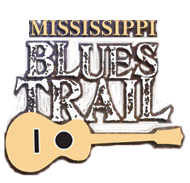Cassandra Wilson
Cassandra Wilson - Jackson
GRAMMY® Award-winning jazz vocalist Cassandra Wilson, a native of Jackson, is known for her broad explorations of various forms of music, including the blues. Her recordings include versions of songs by Delta blues artists Robert Johnson, Son House, and Muddy Waters. Wilson’s father, bassist Herman Fowlkes, Jr., was a leading musician on the Jackson jazz scene. He recorded with Sonny Boy Williamson number 2 and other blues artists. Wilson grew up here on Albemarle Road.
Wilson was declared “America’s best singer” by Time magazine in 2001, in recognition not only of her great accomplishments in jazz but also of her creative approaches to a broad range of music, including the blues. Born Cassandra Marie Fowlkes on December 4, 1955, Wilson first learned clarinet and in her late teens made her professional debut playing folk songs on the guitar. While attending Jackson State University she played guitar and sang with Past, Present, Future, which included fellow students Rhonda Richmond on violin, Yvonne “Niecie” Evers on congas, and Nellie “Mack” McInnis on bass. She also played in local groups including Let’s Eat and These Days, and worked with local musicians Jesse Robinson, Willie Silas, Bernard Jenkins, Claude Wells, and others.
Wilson began singing modern jazz after encouragement by drummer Alvin Fielder, a native of Meridian and a founding member, along with John Reese, of the local Black Arts Music Society. In 1981 Wilson moved to New Orleans, where she performed with jazz musicians Earl Turbington and Ellis Marsalis, and the following year relocated to New York City, where she began a long relationship with the experimental jazz collective M-Base, led by saxophonist Steve Coleman. She recorded her first album in 1986 for the German JMT label and in 1993 she signed with the prestigious Blue Note label. Her Blue Note albums brought Wilson international acclaim as well as GRAMMY® Awards for New Moon Daughter (1996) and Loverly (2003).
Wilson’s father, Herman Fowlkes, Jr. (1918—1993), played an integral role in an under-documented Jackson jazz/R&B scene that produced national figures Teddy Edwards, Freddie Waits, Dick Griffin, and Mel Brown, and local luminaries such as brothers Kermit, Jr., Bernard, and Sherrill Holly. Fowlkes, a native of the Chicago area, played trumpetin a U. S. Army band and in 1948 came to Jackson, where he studied at Jackson State together with music professor William W. “Prof” Davis. Fowlkes was one of the first Mississippi musicians to play electric bass, beginning in 1952. He performed locally in the bands of Carlia “Duke” Oatis, Clarence “Duke” Huddleston, Joe Dyson, Bernard “Bunny” Williams, and O’Neal Hudson, and worked in jazz and blues combos with musicians including Andy Hardwick, Willie Silas, Charles Fairley, and Al Clark. He toured briefly as the bassist in blues balladeer Ivory Joe Hunter’s band and occasionally accompanied national stars, including Sam Cooke and Gatemouth Brown, on local shows. Fowlkes played bass on recording sessions for Trumpet Records with bluesmen Sonny Boy Williamson and Jerry McCain in 1953 and also recalled recording with New Orleans singer Lloyd Price and others.
This is marker No. 100 on the Mississippi Blues Trail, dedicated January 7, 2010.
content © Mississippi Blues Commission
[ BACK TO TOP ]

